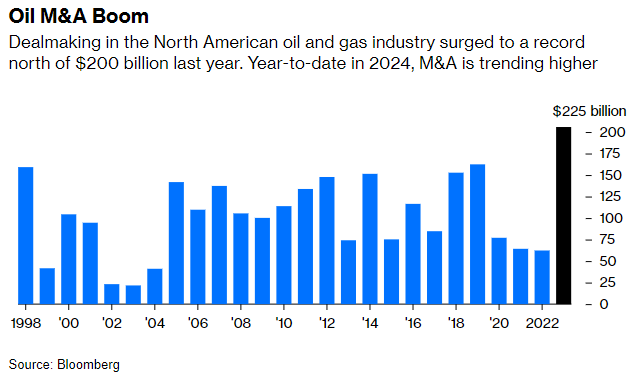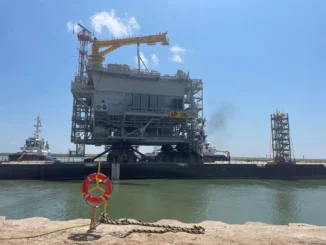
Even after a record $200 billion dealmaking frenzy last year, US oil and gas producers haven’t consolidated nearly enough. On a-per-barrel basis, there are still too many companies, too many chief executives, and too many drilling rigs wooing a limited pool of available capital.
The solution is simple: more M&A.

Granted, the industry is today a lot slimmer than it once was. If you attend industry events where people still exchange business cards – rather than pair iPhones — and you keep a rolodex, just flip through it to see how much has changed since the pandemic.
I did so a few weeks ago as I was setting up a meetings ahead of an industry conference in Houston. The result was a trip downmemory lane: Anadarko Petroleum, among the first to go; Whiting Petroleum, merged and re-named; Endeavor Energy Resources, about to disappear; Cimarex Energy, merged; Concho Resources, long gone; Encana Corp., rebranded. The list goes on.
Still, if my own worn-out rolodex serves as any reference, there is plenty of scope left for a fresh round of consolidation. Few outside the industry know them, but there are plenty of independent exploration and production (E&P) companies in the US. The segment to focus on is publicly listed firms with a market value under $25 billion – but above $1 billion.
In no particular order, as I flip my cards, the bracket includes the likes of EQT Corp., Coterra Energy Inc., Marathon Oil Corp., Ovintiv Inc., Permian Resources Corp., Matador Resources Co., APA Corp. and Civitas Resources Inc. They’re not household names, but for M&A bankers and lawyers I speak to, they’re all candidates for consolidation. I struggle to believe that by the end of the year, some of the above names wouldn’t have either bought someone else or been acquired.
Bigger isn’t always better, but with Wall Street generalist investors largely ignoring oil stocks under $25 billion in market value, boards of directors necessarily need to prioritize size. Some companies may achieve growth in earnings per share by buying back their own stock. But not everyone has that luxury. That’s why more M&A is needed, and it’s already coming: Year-to-date, North American oil and gas companies have already announced nearly $50 billion in deals. If sustained at a similar pace throughout the year, it would nearly match 2023’s record activity.
In most cases, either small and medium-sized E&P firms combine among themselves, or they would be prey for larger companies — ConocoPhillips, Devon Energy Corp. and EOG Resources Inc., three potential 2024 acquirers, if you believe the chatter among bankers and lawyers.
Until now, industry consolidation has followed two broad trends. In the first, large companies with operations across the country bought smaller ones , as Occidental Petroleum Corp. has done since 2019. The second involved smaller E&P outfits buying or merging with peers in the same region they operate, creating pure-play basin champions — think Diamondback Energy Inc.’s deals consolidating the Permian basin of Texas and New Mexico, and those of Chord Energy Corp., now a champion of the Bakken basin of North Dakota.
For this year and 2025, we could see multi-basin deals. While companies with diversified geographical portfolios typically have a tougher time selling their vision, E&P outfits may need to make a virtue out of necessity: Without multi-basin dealmaking, companies may struggle to grow further as some reach the limits of their current geographies. As much as investors love the pure-play story, there’s merit to not having all your eggs in one basket.
The two bigger obstacles for the next consolidation phase start with a “p”: politics and prices.
First, the politics. The US Federal Trade Commission is already scrutinizing the last round of M&A oil deals, and Democrats in Washington are calling for antitrust investigations. “These deals are likely to harm competition, risking increased consumer prices and reduced output throughout the United States,” a group of senators wrote in a November letter to Lina Khan, the head of the FTC. Misguided as they are, the calls are likely to get louder as the election date nears. Ultimately, the FTC is unlikely to block the deals, but it can delay dealmaking by requesting more documents.
So the first of the “p” would more likely delay than derail the deals. The second “p” could prove more of an obstacle, however.
The industry consolidated over the last decade in part thanks to moderating oil prices, with the exception of the 2021-22 spike as Russia invaded Ukraine. When oil prices stay low, the bid-ask spread between sellers and buyers of companies narrows. The opposite is true when prices surge. Push oil prices to $100 a barrel, and deals become more complicated. Thus, the American oil patch will see more M&A in 2024, but whether the activity comes close to last year may depend on forces beyond its control.
Javier Blas is a Bloomberg Opinion columnist covering energy and commodities. He is coauthor of “The World for Sale: Money, Power and the Traders Who Barter the Earth’s Resources.”



